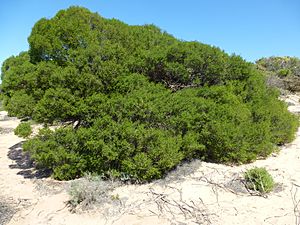Umbrella bush facts for kids
Quick facts for kids Umbrella bush |
|
|---|---|
 |
|
| M. cardiophylla growing near the coast at Kalbarri | |
| Scientific classification | |
| Genus: |
Melaleuca
|
| Species: |
cardiophylla
|
The Umbrella Bush, also known as tangling melaleuca (scientific name: Melaleuca cardiophylla), is a special plant. It belongs to the myrtle family, called Myrtaceae. This plant only grows naturally in the western and southwestern parts of Western Australia. It's a thick, spiky bush with leaves shaped like hearts. Its flowers have unique parts called stamens that look like long claws. The fruits are also easy to spot because they are bumpy.
Contents
What Does the Umbrella Bush Look Like?
The Umbrella Bush is a shrub that can grow up to about 3.5 meters (11.5 feet) tall. Its leaves are arranged one after another along the stem. The leaf stem is attached to the bottom of the leaf. Each leaf is small, about 2 to 8.5 millimeters (0.08 to 0.33 inches) long and 1.75 to 6.5 millimeters (0.07 to 0.26 inches) wide. They have about 12 to 20 veins running lengthwise and often end in a sharp point.
The flowers grow in groups of 1 to 5 along many parts of the branches. The petals and sepals (which are like small leaves under the petals) have edges that are almost clear. The petals fall off soon after the flower opens. The stamens, which are the parts that produce pollen, are white or cream colored. They are grouped into five bundles around the flower, and each bundle looks a bit like a claw. The Umbrella Bush usually flowers between August and January, but this can change. The fruits are round, woody, and bumpy capsules. They are quite large for a melaleuca, about 10 millimeters (0.4 inches) across.
How the Umbrella Bush Got Its Name
The Umbrella Bush was first officially described in 1859. A scientist named Ferdinand von Mueller wrote about it in his book Fragmenta Phytographiae Australiae. He found a sample of the plant near Port Gregory, thanks to Augustus Oldfield.
The scientific name cardiophylla comes from two old Ancient Greek words. Kardia (καρδία) means "heart," and phyllon (φύλλον) means "leaf." So, cardiophylla means "with heart-shaped leaves," which perfectly describes the plant's leaves!
Where Does the Umbrella Bush Grow?
This melaleuca plant grows near the coast in Western Australia. You can find it in areas between Perth, the Exmouth region, and the Pilbara. It grows in sandy soil, often on limestone or sand dunes. It is often found growing with different types of Eucalyptus trees. Some of these include Eucalyptus obtusiflora, Eucalyptus oraria, and Eucalyptus zopherophloia.
Is the Umbrella Bush Protected?
The Umbrella Bush is currently listed as "not threatened" by the Government of Western Australia's Department of Parks and Wildlife. This means it is not in danger of disappearing.
Images for kids
See also
 In Spanish: Acacia paraguas para niños
In Spanish: Acacia paraguas para niños




